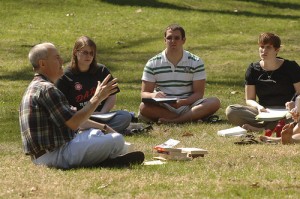 For those of us who attended college right out of high school, we dreaded the “old people” who would sit in the front of the class and ask a lot of questions. It seemed that the older you got, the harder it was to grasp concepts. Now as I’m into my 30’s I find that if I were to go back to school, I would probably do something similar. Not that I can’t grasp the concept, but rather I want to absorb as much knowledge as possible. Going back to school after your 20’s is a whole different game than when you’re in your teens for several reasons.
For those of us who attended college right out of high school, we dreaded the “old people” who would sit in the front of the class and ask a lot of questions. It seemed that the older you got, the harder it was to grasp concepts. Now as I’m into my 30’s I find that if I were to go back to school, I would probably do something similar. Not that I can’t grasp the concept, but rather I want to absorb as much knowledge as possible. Going back to school after your 20’s is a whole different game than when you’re in your teens for several reasons.
New Peers
Even just 5 years age different puts you into a new bracket of peers. So if you are 23 and in a class with 18 year olds, you won’t have that much in common. Now put a 30 year old in a class with 18 year olds, and everyone seems childish and immature. This makes it so you would rather get in, learn the material, and get out. No hanging around after class chatting, no going to parties at night, and no meeting up in the Student Union Building just to lounge around during the day.
New Focus
Being a teenager in school you see life (mostly) as one big party. The tuition is not really that relevant, and you don’t have as much of a grasp on how much it is really costing you. Plus, sleep is for the birds. Fast forward 10 to 15 years and suddenly you would rather have a quiet evening at home than to go out drinking at night. If you don’t get your 8 hours of sleep you are worthless, and those thousands of dollars in tuition suddenly become very real (and very painful since you know the work it takes to earn them).
New goals
Many teens enter college with no real aspirations in sight. They know they want a degree, but they are not sure which one. So they spend a few years taking general education classes and learning what they like. Those going back to school after their 20’s know exactly what they want. Rather than fool around dabbling here and there they go for degrees that many teenagers do not even know exist. Instead of just taking the typical biology, psychology, physics and the like, you can head right toward the actuarial studies, golf course engineering, or winemaking classes.
New Motivation
When going to school as a teen your motivation is to get a degree and make a bunch of money. But you also want to have fun, have a social life, and get the whole college experience. Later in life your motivation changes. You do not need the parties or the acceptance of fellow students, but rather you want to better yourself. You are getting this degree so that you can get a better job and take care of your family. Your motivation changes from going to college to have fun, to going to college to take care of your family.
Going back to college is hard, especially if you have to work full time while doing so. But it can be done, and often non-traditional students will accomplish their goals in a shorter amount of time than the traditional student takes. You are more goal oriented, have a steadfast motivation, and you know what you want out of your studies. There is nothing wrong with being the “old people” in class. If I were to go back, I might even sit in front and ask dumb questions just so I could hear the teenagers groan.

I did this. It had its benefits along with its challenges.
For one, it’s very easy to find the motivation to be the guy who sits up front and asks all the questions.
Other people will be very important in making or breaking your experience too. Some schools in particular take a lot of non-traditional folks in (many of them military), so they’re great at understanding the concerns and hurdles you’ll invariably run into when returning. Just as important is finding a community of people in a similar situation.
I completely agree. My first two years I was a typical student, right out of high school. I transferred schools after my sophomore year, took a year off, and then went back to school in the evenings while working full time at the university. My perspective was entirely different. I never missed class, paid attention…mostly because I was now working in order to go to school, rather than the other way around.
I can’t imagine going for a Bachelor’s degree at a typical 4 year school dominated by kids straight out of college. I’d feel very out of place for sure.
I went to school at 22 while working full time. I gravitate more towards older more mature adults so it worked great for me. l attended in the evenings and avoided most of the younger crowds. I enjoyed going when I did because I was more focused.